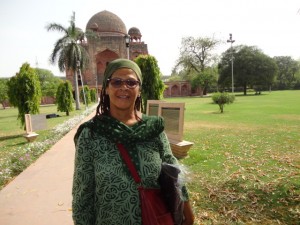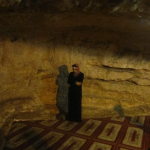At the end of July, American Islamic Scholar Amina Wadud was scheduled to speak at the University of Madras. Her engagement was cancelled by the university at the 11th hour, in the midst of confusion after the city’s police force alleged unnamed threats of violence, suggested her appearance had earlier precipitated riots in Tamil Nadu (flatly false, as she has never spoken there before), and refused to offer security.

The University of Madras’s decision elicited a slew of sensational headlines within India and abroad, including The Hindu’s “One SMS, and Amina Wadud’s lecture was called off,” and the American Bazaar’s “After furor in NYC, Amina Wadud lands in controversy in Chennai.” In response, Dr. Wadud expressed her dismay in her blog post, “Why I Try to Stay Away from the Media.” Few articles gave real credence to Dr. Wadud’s substantive contributions to Islamic thought, and virtually no one mentioned that she has spent nearly a year living, speaking, and working in India, without any issues. Instead, the general, mainstream coverage emphasized threats from “fringe” Muslim groups and painted Dr. Wadud as a brazen feminist looking to pick a fight. Another article in The Hindu, for example, suggested that there was no support for Dr. Wadud’s talk at the university, quoting a source from the Islamic Studies Department at the University of Madras, saying, “we got an email from a representative of a Muslim outfit. The mail expressed shock over us inviting someone who does not accept the Quran completely, supports homosexuality and mixed prayer congregations.”
As a scholar, Dr. Amina Wadud has enormous expertise offering interpretations of Islam and the Qur’an from lenses committed to gender analysis and feminism. Her work is, indeed, unapologetic and firm, as it should be, given that it addresses practical, living issues related to social justice. Certainly, I’ve encountered Muslims who are uncomfortable with Dr. Wadud’s work, irrationally fearing her efforts will lead to bid’ah, or that her interpretations create innovations in faith that change practice away from a “true” practice of Islam, with people specifically citing her activism associated with women-led prayer. Those same people, I think, largely buy in to the media myth that Islam is a monolith, simply assuming that it’s possible to unearth a singular list of practices that constitute Islam, regardless of when and where we live. But there is tremendous diversity within faith. My mother’s religious upbringing and beliefs, for example, were defined within the parameters of the Chisti Sufi Silsilah in South India. As a result, my religious practices as a Muslimah of Hyderabadi heritage look different than those of my Iranian Shi’a sisters or other Muslims across the globe. Those differences don’t de-legitimate Islam, but add complexity, richness, and opportunities to seek communion with and learn from others. Dr. Wadud’s analyses, in other words, come not from a place of criticizing Islam or trying to deviate from it, but instead aim to meaningfully and deeply engage with faith. Her work comes from a place of generous love and unwavering commitment to Islam, not from an aim to subvert it.
As an accomplished female academic, Dr. Wadud inadvertently challenges social expectations that “pious” Muslim women are always silent and compliant. In 2005, when she led Friday prayers in a mixed gender congregation, the hype from the media also followed, forcing Islamic scholars to start a serious re-examination of gender and prayer at fundamental and foundational levels. In “I Am One of the People,” Ahmed Elewa and Laury Silvers present a summary and analysis of some of those responses. In 2008, on his Toronto show “Let the Quran Speak,” Imam Shabir Ally acknowledged that Islamic scholars need to seriously re-examine assumptions about the gender of those leading congregations in prayer. His comments, however, seemed to fall under the radar and were entirely missed by the media. In 2011, Hamza Yusuf, co-founder of Zaytuna College and a darling of the mainstream American Muslim circuit, conceded that historical Muslim legal opinions do provide some (albeit limited) circumstances in which women-led prayer is permissible, but his comments seemed to barely make a ripple except for on the blogosphere.
Gender constantly colours the contexts in which we work, affects the way in which we are perceived, and creates parameters around what is acceptable behaviour. Vitriol is reserved for women who step outside their gender norms. No, Muslim leaders such as Imam Shabir Ally and Hamza Yusuf don’t offer unequivocal support for women-led prayer the way that Dr. Wadud does. But that these male leaders can consider women-led prayers have some inherent legitimacy, without facing nearly the same reaction that follows Dr. Amina Wadud’s activism, makes a gendered double standard obvious.
The Juma congregation led by Dr. Wadud in 2005 and the cancellation of her engagement at the University of Madras, however, should not overshadow her serious, theologically transformative contributions to Islamic academia. In Qur’an and Woman, Dr. Wadud presents an interpretive analysis of the Holy Book, dissecting key passages and words, from a women-centred perspective. In Inside the Gender Jihad, she helps redefine Islam in terms of gender justice and discusses practical, living realities for women in the context of faith. The impacts of Dr. Wadud’s scholarship have been discussed in “A Jihad for Justice: Honoring the Life and Work of Amina Wadud,” reviewed by MMW’s Eren last year.
The brilliance of Dr. Wadud’s work lies in that she enables and facilitates conversations that allow us to deeply engage with our faith, to acknowledge the Qur’anic script is forever dynamic, and offer interpretations that are relevant to our varying social contexts. While her contributions to gender justice seem to position her outside of most mainstream Muslim academic circles, the strength of her scholarship has forced a broad re-examination of women-led prayer and has empowered the opening of mosques that uphold the values of gender equity such as El Tawhid Juma Circle (ETJC) and, more recently, the Inclusive Mosque Initiative. Creating social change from the margins requires enormous courage, commitment, and determination in the face of backlash and loneliness. Dr. Amina Wadud’s exemplifies those qualities in spades, and portraying her, as recent headlines did, only as source of controversy and conflict erases a much deeper spiritual and academic legacy.












